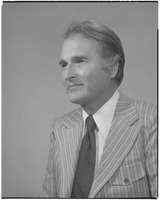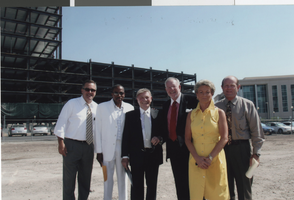Search the Special Collections and Archives Portal
Search Results

Photographs of Ron Rudin, October 18, 1974
Date
Archival Collection
Description
Portrait photographs of Ron Rudin, a member of the Board of Realtors. 4x5 negatives.
Image

Transcript of interview with Morris "Moe" Dalitz by Brenda Baxter, November 4, 1977-March 30, 1978
Date
Description
Interview with Morris "Moe" Dalitz by Brenda Baxter, on several dates in late 1977 to early 1978. In this interview, Dalitz talks about his business and career endeavors before coming to Las Vegas, which included a laundry service and military service. Dalitz partnered with Wilbur Clark and became a successful hotel and casino owner in Las Vegas, as well as a real estate developer with properties including the Boulevard Mall and Sunrise Hospital.
Moe Dalitz was born in Boston in 1899, and soon after his family moved to Detroit, Michigan and where his father started a linen supply company. In 1930, during Prohibition, Moe moved to Cleveland, Ohio and he became involved with the then-illegal liquor business. At the age of 41, Dalitz enlisted in the Army and was stationed at Governors Island. Moe was put in charge of laundries and dry cleaning because of his experience in the laundry business. He played an important role in creating mobile laundry units that were used in the front lines in North Africa. His ingenuity won him a non-combatant award for his "unusual interest, ingenuity and talents" applied during his service. At the end of war, Moe returned to Cleveland, where his partners were successfully carrying on their business. It was then that they decided to go into the casino-nightclub business, opening nightclubs in Ohio and Kentucky. A couple years later, Moe and his partners met Wilbur Clark and agreed to finance his inactive project in Las Vegas. Thus, in 1950, the Desert Inn Hotel and Casino opened, and Moe Dalitz ushered in a new era for the city. Moe and partners continued to elevate the sophistication of the Strip when they acquired the operating lease to, and later part ownership of, the Stardust Hotel and Casino. Moe was instrumental in bringing the French Lido de Paris show to the Stardust, which was considered the most spectacular nightclub show produced in Las Vegas at its time. In addition to his gaming industry ventures, Moe engaged in significant real estate development, along with partners Allard Roen, Merv Adelson and Irwin Molasky. Their projects included Sunrise Hospital, The Boulevard Mall and Las Vegas Country Club as well as La Costa Resort and Spa in California. At the time of the interview, Moe was involved with the construction of a downtown hotel and casino. Moe Dalitz was the recipient of the Humanitarian Award from the American Cancer Research Center, and supported the Variety Club and the Home of the Good Shepard, amongst other charities.
Text

Photographs of the groundbreaking ceremonies for the Molasky Corporate Center, 2006
Date
Archival Collection
Description
Group of photographs showing Irwin Molasky and others at a podium during the groundbreaking ceremonies for the Molasky Corporate Center at 100 N. City Parkway in Las Vegas, Nev.
Image

Video, Jewish Community Campus of Las Vegas, February 2000
Date
Archival Collection
Description
Jewish Federation event held to celebrate a gift from Priscilla Schwartz to build a westside campus for the Jewish Community of Las Vegas.
Moving Image

Transcript of interview with Janellen Radoff by Barbara Tabach, September 26, 2016
Date
Archival Collection
Description
Jane Radoff?s sophisticated eye and creative energy follow her wherever she goes. Her interior designs have anonymously touched most all who have walked through many of the Strip casinos and hotels. Her working partnership with interior designer Roger Thomas for Steve Wynn properties are among the most iconic of recent era. Born 1940 in Pittsburgh, PA, to Adelaide and Meyer Sachs, Jane was destined to lead a colorful life. Her mother was a local radio/TV personality with her own show and her father was successful real estate entrepreneur. Jane attended the University of Michigan where she honed her design skills. Before moving to Nevada, Jane?s career path included Restaurant Associates, a short stint as a girl Friday for Johnny Carson, and freelance product design while starting a family. Then in 1978, her husband William ?Bill? Radoff accepted a purchasing director position from Billy Weinberger and Neil Smythe at Caesars. With her signature wry humor, she reflects on her early observations of Las Vegas, and eventually working with Roger Thomas. In time, the duo worked together to bring groundbreaking interiors to the Strip, primarily with Steve Wynn. As most Jewish transplants, the Radoffs first belonged to Temple Beth Sholom. Later she was the interior inspiration for Congregation Ner Tamid where Jon Sparer did the architectural design. She is a quiet icon of Las Vegas?s turn to elegance and warmth in design of public spaces.
Text
Audio clip from interview with Suzie Chenin, September 29, 2015
Date
Archival Collection
Description
In this audio clip, Chenin discusses her father's career as a dentist in Las Vegas.
Sound
Audio clip from interview with Al Levy by Cheryl Caples, February 23, 1979
Date
Archival Collection
Description
Part of an interview with Al Levy on February 23, 1979. In this clip, Levy discusses his childhood, living in Las Vegas, and his experience at Las Vegas High School.
Sound
Audio clip from interview with Lovee duBoef Arum by Barbara Tabach, November 1, 2016
Date
Archival Collection
Description
Part of an interview with Lovee duBoef Arum on November 1, 2016. In this clip, Arum discusses her childhood, family life, and what brought her to Las Vegas.
Sound

Transcript of interview with Arne Rosencrantz by Claytee White, February 9, 2010
Date
Archival Collection
Description
In this interview, focused on the John S. Park neighborhood of Las Vegas, Arne Rosencrantz discusses his childhood growing up in Las Vegas. He talks about local businesses, including his father's furniture store, as well as schools and churches in the neighborhood.
Arne Rosencrantz remembers living on Beverly Way from 1954 to 1970. Like so many others from that era, he attended Fifth Street School, John S. Park Elementary School, John C. Fremont Middle School and graduated from Las Vegas High School. As a Jew, he was in a small minority, but fondly recalls growing up in the dense Mormon population of John S. Park Neighborhood. As a youngster, life in Las Vegas was filled with fun. The desert provided opportunity to hunt lizards and rabbits. Kids walked to school without concern. They played ball and found the Strip casinos welcoming to locals. He tells how the social issue of segregation of the 1960s did not affect him personally, but how local movie theatre owner Lloyd Katz fought to make his Huntridge and Fremont theatres integrated. He also reminisces about his father opening Hollywood Furniture and later Garrett's Furniture, which Arne operated until retiring in 2001. During the interview, he lists other furniture companies and the strong assortment of other retailers and restaurants that served the neighborhood.
Text

Transcript of interviews with Al Levy by Cheryl Caples, February 23, 1979 and by Martha Zehnder, March 8, 1981
Date
Archival Collection
Description
Part I: Interview with Al Levy by Cheryl Caples on February 23, 1979. At the time of this interview, Levy was serving on the city commission (now the Las Vegas City Council). He talks about growing up in Las Vegas and attending Las Vegas Grammar School (Fifth Street School) and Las Vegas High School. He mentions the Helldorado events, recreational activities, and raising a family in Las Vegas. Part II: Interview with Al Levy by Martha Zehnder on March 8, 1981. Levy recalls much of the same information as the previous interview, and again talks about his schooling and attending the University of Southern California. He returned to Las Vegas to assist his father with his grocery stores. Levy talks about the polio epidemic as the reason that children were not allowed to swim at public or hotel pools. He discusses his real estate firm, Levy Realty Company, his involvement in the community and the Jaycees (Junior Chamber of Commerce), and the booming hotel industry. Levy also discusses some city leaders he's known, including Mayor Gragson. He talks about his Jewish faith and having to go to Los Angeles to train for his bar mitzvah because there were no rabbis living in Las Vegas.
Text
